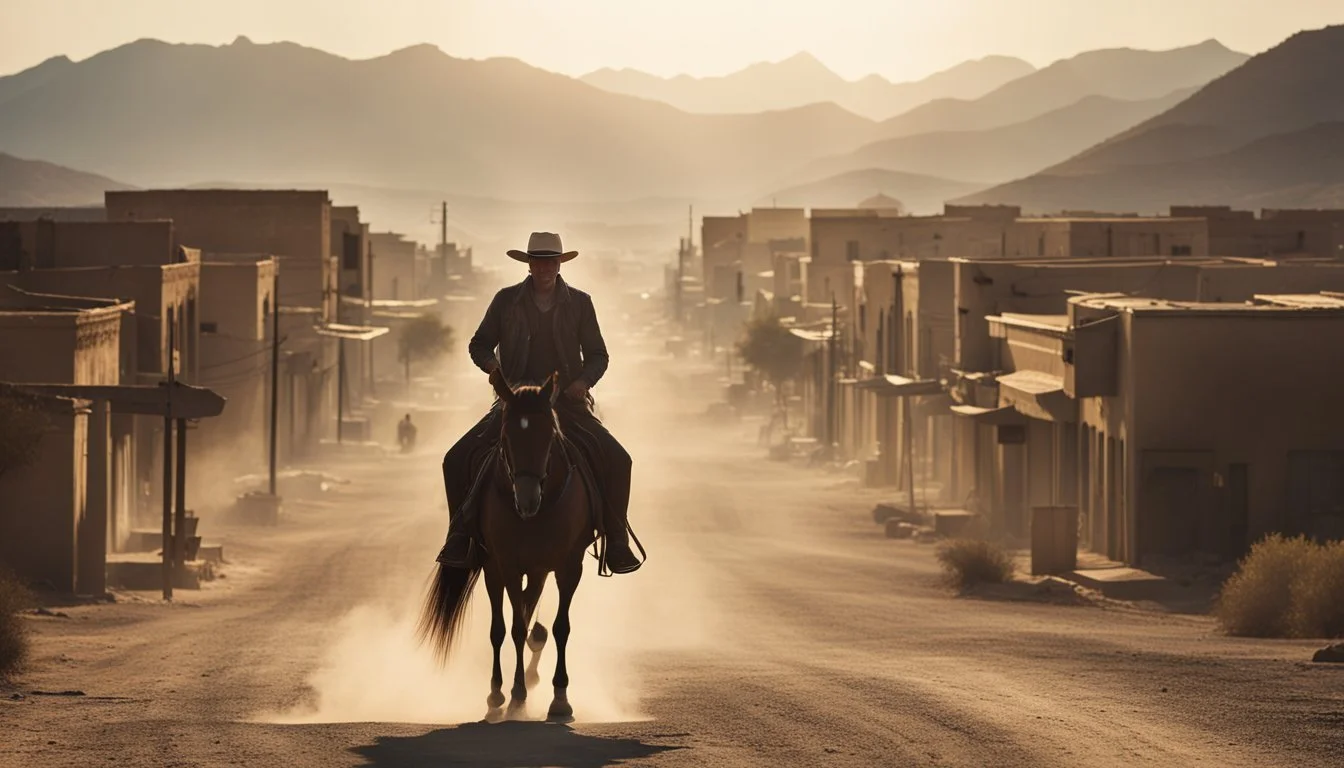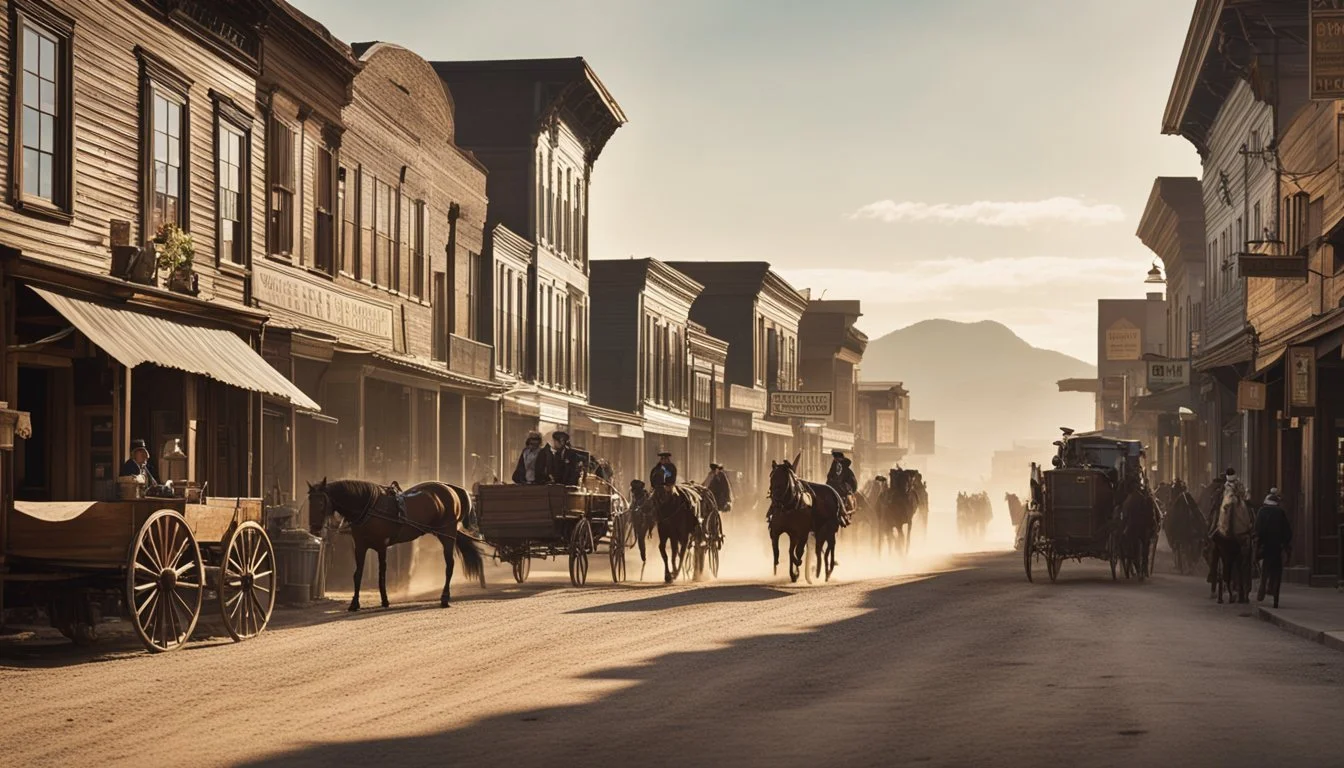6 Eye-Opening Documentaries About Lawrence Murphy's Lincoln County
Unveiling the Wild West's Forgotten Conflict
Lawrence Murphy played a pivotal role in the Lincoln County War, a violent conflict that erupted in New Mexico during the late 1870s. As a businessman and cattleman, Murphy's influence extended throughout the region, shaping the economic and political landscape of Lincoln County.
Documentaries exploring Murphy's involvement in the Lincoln County War offer viewers a deeper understanding of this tumultuous period in American history. These films shed light on the complex web of relationships, business dealings, and power struggles that ultimately led to bloodshed and the rise of legendary figures like Billy the Kid. By examining Murphy's actions and motivations, these documentaries provide valuable insights into the broader social and economic forces at play during this turbulent time in the American West.
1) The Kid from Lincoln County
Billy the Kid emerged as a central figure in the Lincoln County War of 1878. Born Henry McCarty, he gained notoriety for his involvement in the conflict between rival business factions in New Mexico Territory.
The young outlaw's exploits during this period captured public imagination. His daring escape from the Lincoln County Courthouse in 1881 became legendary, solidifying his place in Western folklore.
Billy's connection to Lawrence Murphy, one of the primary instigators of the war, added complexity to his story. Murphy's business interests and political influence played a significant role in shaping the events that unfolded.
The Kid's life and death have been the subject of numerous documentaries. These films explore his brief but impactful career as a gunslinger and his enduring legacy in American popular culture.
Billy the Kid: American Experience (2012)
2) The Lincoln County War
The Lincoln County War erupted in 1878 in New Mexico Territory. It began as a conflict between two rival business factions in Lincoln County.
Lawrence Murphy and James Dolan controlled the lucrative mercantile trade in the area. They faced competition from English entrepreneur John Tunstall and his associates.
Tensions escalated when Tunstall was murdered by members of a posse in February 1878. This event sparked a series of violent reprisals and counter-reprisals.
Billy the Kid, who had worked for Tunstall, joined a group called the Regulators to seek revenge. The Regulators engaged in shootouts and killings with Murphy-Dolan supporters.
The conflict drew in various ranchers, lawmen, and outlaws. It involved cattle rustling, murders, and property destruction across Lincoln County.
The war officially ended in July 1878 when President Rutherford B. Hayes removed the corrupt local officials. However, violence and feuding continued for several more years.
This period of New Mexico history has been dramatized in numerous films and books. It remains a significant chapter in the mythology of the American Old West.
3) Murphy's Reach: The Untold Story
Lawrence Murphy's influence extended far beyond the immediate confines of Lincoln County. This documentary explores the lesser-known aspects of his reach and impact.
Murphy's business dealings stretched across New Mexico Territory. He cultivated relationships with powerful politicians and military figures, ensuring protection for his enterprises.
The film delves into Murphy's alleged connections to organized crime syndicates in the East. These associations may have provided him with additional resources and support.
Murphy's rivalry with John Tunstall had ripple effects throughout the region. The documentary examines how their conflict affected other ranchers and merchants in neighboring counties.
The film also investigates Murphy's legacy after the Lincoln County War. His actions shaped local politics and economic development for years to come.
Viewers gain insight into Murphy's personal life and motivations. Interviews with historians and descendants offer new perspectives on this controversial figure.
Murphy's Reach: The Untold Story (2022)
4) Lawrence Murphy: Friend or Foe?
Lawrence Murphy played a complex role in the Lincoln County War. As an Irish immigrant and Civil War veteran, he established himself as a prominent businessman in New Mexico Territory.
Murphy, along with partner James Dolan, owned the only store in Lincoln County. Their monopoly allowed them to charge exorbitant prices, exploiting local residents and small ranchers.
The Murphy-Dolan mercantile's practices created tensions with competitors. This conflict escalated into the infamous Lincoln County War, pitting Murphy and his allies against rival business interests.
Murphy's actions suggest he prioritized profit and power over community well-being. His business tactics and political connections made him a controversial figure in Lincoln County history.
While some viewed Murphy as an opportunistic businessman, others saw him as a corrupt influence on local affairs. His legacy remains a subject of debate among historians studying the Old West.
Learn more about Lawrence Murphy
5) The Power Struggle in Lincoln County
The Lincoln County War of 1878-1881 centered on a fierce rivalry between two factions vying for economic and political control. Lawrence Murphy and James Dolan, Irish immigrants, initially held power through their monopoly on government cattle contracts and a general store.
John Tunstall and Alexander McSween challenged this dominance by opening a competing store. This sparked intense conflict as both sides sought to protect their interests and expand their influence in the region.
The struggle escalated into violence, with notable figures like Billy the Kid becoming involved. Gunfights, murders, and property destruction marked this tumultuous period in New Mexico Territory history.
The power dynamics shifted as alliances formed and broke. Ranchers, lawmen, and hired guns all played roles in the complex web of relationships that defined the conflict.
This battle for control reshaped Lincoln County's economic and political landscape. It left a lasting impact on the area and became a defining chapter in Wild West lore.
6) Inside Murphy's Empire
Lawrence Murphy established a powerful business empire in Lincoln County, New Mexico during the 1870s. His influence extended far beyond simple commerce, shaping the region's economic and political landscape.
At the heart of Murphy's operations was a general store known as "The House." This establishment served as both a mercantile hub and a center of financial power in the area.
Murphy's business practices were often controversial. He charged high prices for goods and operated a monopolistic system that left many local residents with few alternatives.
The Murphy-Dolan partnership formed in 1874, further consolidating their control over local trade. This alliance allowed them to secure lucrative government contracts for supplying cattle.
Their business empire extended into banking and cattle ranching, giving them significant leverage over the region's economy. This concentration of power would eventually lead to tensions that sparked the Lincoln County War.
Learn more about Lawrence Murphy and the Lincoln County War
Historical Background of Lincoln County War
The Lincoln County War erupted in New Mexico Territory in the late 1870s, stemming from economic and political rivalries. This conflict involved cattle barons, merchants, and lawmen, shaping the region's history and spawning legendary figures.
Origins and Causes
The war's roots trace back to the monopoly held by Lawrence Murphy and James Dolan over Lincoln County's mercantile and banking business. Their firm, Murphy & Dolan, controlled local commerce and enjoyed political connections.
In 1876, John Tunstall and Alexander McSween arrived in Lincoln County. They established a rival store, challenging Murphy and Dolan's dominance. This competition sparked tensions that escalated into violence.
Economic interests intertwined with cattle rustling and land disputes, further fueling the conflict. The arrival of Billy the Kid added another volatile element to the mix.
Key Figures and Their Roles
Lawrence Murphy: Irish immigrant and Civil War veteran who co-founded Murphy & Dolan. He wielded significant influence in Lincoln County.
James Dolan: Murphy's business partner and a central figure in the conflict.
John Tunstall: English-born rancher and businessman who opposed Murphy and Dolan's monopoly.
Alexander McSween: Lawyer and Tunstall's partner in the rival store.
Billy the Kid: Born Henry McCarty, he became a notorious outlaw and fought for the Tunstall-McSween faction.
Pat Garrett: Sheriff who pursued Billy the Kid and played a crucial role in ending the war.
Major Events and Turning Points
February 18, 1878: Murder of John Tunstall, sparking open hostilities.
April 1-5, 1878: Battle of Blazer's Mills, resulting in casualties on both sides.
July 15-19, 1878: Battle of Lincoln, culminating in the burning of McSween's home and his death.
July 14, 1881: Pat Garrett kills Billy the Kid, marking the end of the major violence.
These events transformed Lincoln County, leaving a lasting impact on New Mexico's history and folklore. The conflict's aftermath reshaped local power structures and sparked enduring legends.
Lawrence Murphy's Influence and Legacy
Lawrence Murphy left an indelible mark on Lincoln County, New Mexico. His business ventures, alliances, and conflicts shaped the region's economy and social dynamics during the late 19th century.
Business Ventures
Murphy established "L. G. Murphy & Co." in Lincoln County in 1869. The company quickly became a dominant force in local commerce. Murphy's store monopolized mercantile goods and banking services, giving him significant control over the area's economy. In 1873, he hired James Dolan, a fellow Irish immigrant, who later became his business partner. Together, they expanded their influence and profits.
Their most lucrative venture was securing a contract to supply cattle to the government. This deal catapulted Murphy and Dolan to significant wealth almost overnight. The partnership's success allowed them to diversify their interests and strengthen their grip on local trade.
Conflicts and Alliances
Murphy's business practices and growing power led to tensions with competitors and locals. His alliance with James Dolan formed a formidable duo that other merchants struggled to challenge. Their dominance sparked resentment among those who felt squeezed out of economic opportunities.
The most notable conflict arose with John Tunstall and Alexander McSween, who attempted to break Murphy and Dolan's monopoly. This rivalry escalated into the infamous Lincoln County War. Murphy's connections with local law enforcement and politicians often gave him an edge in these disputes.
Impact on Local Economy
Murphy's influence on Lincoln County's economy was substantial but controversial. His store, known as "The House," was criticized for charging exorbitant prices. This practice strained local residents' finances while enriching Murphy and his associates.
Despite the criticism, Murphy's businesses provided essential services and goods to the area. His cattle contracts brought significant money into the local economy. However, the concentration of wealth and power in Murphy's hands limited economic diversity and opportunities for others.
Murphy's legacy in Lincoln County remains complex. While he contributed to economic growth, his monopolistic practices and the conflicts they sparked left a lasting impact on the region's history and development.
Modern Perception and Interpretation
Lawrence Murphy's role in the Lincoln County War continues to fascinate historians and the public alike. His legacy has been examined through academic research, portrayed in various media, and commemorated at historical sites.
Scholarly Analyses
Recent academic studies have reassessed Murphy's impact on the Lincoln County War. Historians now emphasize his business practices and political connections as key factors that fueled the conflict. Some scholars argue that Murphy's monopolistic control over local commerce created economic tensions that eventually erupted into violence. Others highlight his relationships with territorial officials, suggesting these ties allowed him to maintain power despite growing opposition.
New research has also explored Murphy's background, including his military service and immigration from Ireland, to provide context for his later actions in New Mexico.
Cultural Representations
Murphy's character has appeared in numerous films, TV shows, and books about the Lincoln County War. While often portrayed as an antagonist, some modern interpretations offer a more nuanced view of his motivations and actions.
Several documentaries have explored Murphy's role, presenting interviews with historians and examining primary sources to shed light on his business practices and political maneuverings. These productions aim to separate fact from legend, offering viewers a more balanced perspective on Murphy's life and legacy.
Tourism and Historical Sites
Lincoln, New Mexico attracts history enthusiasts interested in the Lincoln County War. The town preserves several buildings from the conflict era, including Murphy's former store.
Guided tours and museums provide visitors with information about Murphy's business operations and his rivalry with John Tunstall. These sites often display artifacts and documents related to Murphy, offering tangible connections to his life and times.
Local events and reenactments sometimes feature portrayals of Murphy, allowing tourists to engage with this historical figure in a more immersive way.









